Google’s Site Reputation Abuse Policy will go into effect on May 5th
Google has been actively combating spammy content since rolling out its latest Core Update in March 2024, which also included revisions to its spam policies.
The company announced its intention to remove 40% of the current spam from its index, demonstrating Google’s trust in its spam-fighting systems.
One of the new policies introduced was the ‘site reputation abuse’ policy
Its aim is to clamp down on websites that publish low-quality, third-party pages in an effort to manipulate search rankings.
However, the policy won’t officially take effect until May 5th.
They also confirmed that they intend to combat site reputation spam using both manual actions (carried out by humans) and search algorithms (managed by machines).
Manual actions are significant measures, and they could lead to your content completely disappearing from the search engine results pages (SERPs). Algorithm enforcement is somewhat less severe (it devalues the ranking influence of web pages instead of removing them from the index entirely), but it can still have a devastating impact on your rankings.
Will the Google’s Site Reputation Abuse Policy impact your website?
“What is Site Reputation Abuse?”
Here’s how Google explains what they deem to be site reputation abuse:
“Sometimes websites that have their own great content may also host low-quality content provided by third parties with the goal of capitalizing on the hosting site’s reputation.”
They also offer an example of a third party publishing payday loan reviews on an educational website.
As the educational website is already trusted by Google and consistently achieves high rankings for nearly all of its content, the low-quality third-party pages will benefit from this association.
SEOs (search engine optimizers) have long referred to this practice as parasite SEO.
You can compare these spammy third-party web pages to leeches, which attach themselves to larger organisms to feed off their resources.
These third-party pages function similarly, but instead, they leech off the hosting website’s traffic and search rankings.
Google detests this practice because it inundates its search results with spammy, low-quality content that offers no value to users (which has recently become a significant issue for them).
The site reputation abuse policy applies to all third-party content on websites, including sponsored, advertising, and partnered content.
Do you need to remove all third-party content from your site? Does this mean that all third-party content is harmful?
Not necessarily.
Google clarifies that site reputation abuse only occurs when “third-party pages are published with little or no first-party oversight or involvement, where the purpose is to manipulate Search rankings by taking advantage of the first-party site’s ranking signals.
So, if you have high-quality sponsored or partnered content on your site that you directly oversaw (and is relevant to the rest of your website), you won’t have much to worry about.
Google is primarily concerned with low-quality third-party content that provides no value to users and is completely unrelated to the first-party website’s purpose.
That means you don’t need to panic and delete all the guest posts on your blog (as long as they’re relevant) or all the sponsored posts from influencers.
Remember, Google has a team of humans and machines reviewing each website, and its algorithm has become adept at identifying spam. If your third-party content is truly relevant and valuable, you shouldn’t need to delete it.
Google considers third-party content as site reputation abuse when it’s published with minimal or no oversight from the hosting website, and its purpose is to manipulate search rankings by leveraging the hosting website’s ranking signals.
- Third-party pages on an educational website: If an educational website hosts third-party pages like payday loan reviews without proper oversight or relevance to its educational purpose, Google may consider this as site reputation abuse.
- Low-quality content on a trusted news website: If a trusted news website publishes low-quality articles or blog posts solely to manipulate search rankings for unrelated websites, Google could view this as site reputation abuse.
- Irrelevant sponsored or advertising content: Google may identify sponsored or advertising content as site reputation abuse if it’s irrelevant to the hosting website’s theme or purpose and serves only to manipulate search engine rankings.
For example, Google provides this example, “A sports site hosting a page written by a third-party about “workout supplements reviews,” where the sports site’s editorial staff had little to no involvement in the content and the main purpose of hosting the page is to manipulate search rankings.”
This likely refers to the scandal Sports Illustrated encountered last November involving AI-generated content.
Technology news website Futurism found AI-generated product reviews with fake authors on Sports Illustrated’s website.
The fake reviews and author profiles were supplied by a third-party company named AdVon, which manages E-commerce product reviews for Sports Illustrated.
When questioned, The Arena Group team (the owner of SI’s publishing rights) stated they were unaware that AdVon was utilizing AI-generated content.
Remember the aspect of Google’s policy concerning the removal of spammy third-party content lacking first-party oversight or involvement? This incident precisely illustrates the type of scenario they were addressing.
Coupons, gambling, and reviews
In most cases, troublesome third-party content involves coupon codes, gambling sites, and spammy product reviews (similar to those seen on Sports Illustrated).
Regarding news sites featuring coupons, Google states:
“A news site hosting coupons provided by a third-party with little to no oversight or involvement from the hosting site, and where the main purpose is to manipulate search rankings.”
For example, the prominent news website USA Today hosts a subdomain dedicated to an extensive coupon network, potentially putting the site at risk with Google once May 5th arrives.
How to Get Ready for the Site Reputation Abuse Policy
Now that you understand what the site reputation abuse policy entails, what steps should you take in response?
First, keep in mind these two essential qualifying factors:
- There should be minimal to no oversight or involvement from the first-party website.
- The content must offer no value to users and must be entirely unrelated to the first-party website.
If your sponsored, advertising, or partnered content doesn’t meet these criteria, you shouldn’t have any concerns.
However, if you have dubious third-party content that’s leveraging your established trust with Google, you’ll need to either:
- De-index the offending pages to prevent manual actions.
- Terminate partnerships with questionable third parties.
As long as you complete both tasks before May 5th, you should be fine.
Wrapping Up: Google’s Upcoming Spam Policy
In summary, Google’s site reputation abuse policy will take effect on May 5th, and the company will employ a mix of manual interventions and anti-spam algorithms to uphold it.
Google aims to eliminate low-quality third-party content that serves solely to manipulate search rankings and benefit first-party websites with reputable reputations.
Do you need help getting your SEO strategy in order? Click the link below to find out how we can help you.










